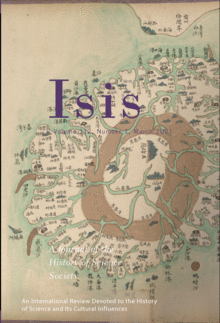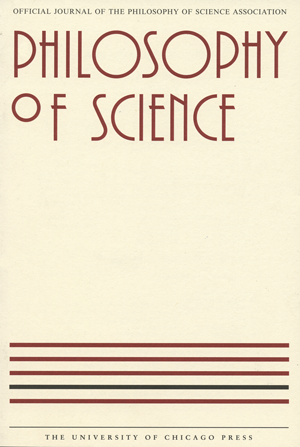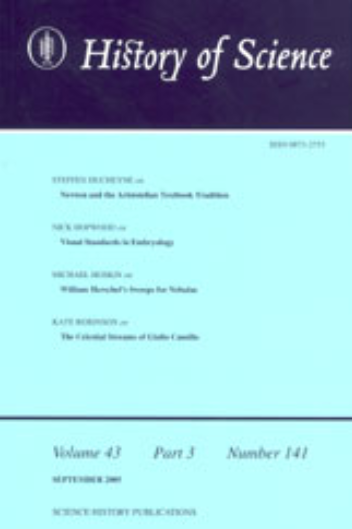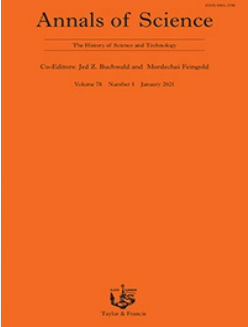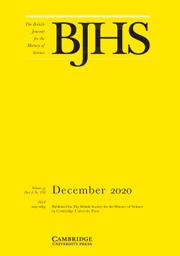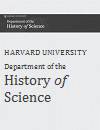JOURNAL OF DIALECTICS OF NATURE
A Comprehensive, Academic Journal of the Philosophy, History, Sociology and Cultural Studies of Science and Technology
Latest Articles
View all

-
The Decline of Science in Britain: Crisis and Reform of British Science and Technology System in the Nineteenth Century Abstract: The idea of the “decline of science in England” was proposed in the 1930s by Charles Babbage in his book Reflections on the Decline of Science in England. From a perspective of the history of science and technology system, this article argues that the main factors hindering the development of science in Britain were the mechanism of private patronage and the resulting amateurism in scientific practice. Babbage implied that the situation of science in Britain could be changed essentially only by transforming private patronage into government sponsorship. He offered some advice for reform, in the areas of research funding, the organization, and the administration of scientific work. To some extent, these suggestions promoted the processes of government support for science, fostered the training of scientific personnel and the formation of professional research teams, and facilitated the founding of the British Association for the Advancement of Science and the reform of the Royal Society of London. Key Words: Charles Babbage; Nineteenth century; British science; Science and technology system; PatronageIssue:Volume 47, lssue 11, November 2025Page: 1-9
-
Testing, Challenging, and Developing: Is Integrated Information Theory Pseudoscience? Abstract: This article examines the recent controversy surrounding Integrated Information Theory (IIT) and its alleged pseudoscientific status, analyzing its theoretical connections and tensions with the Theory of Neuronal Group Selection (TNGS), weak IIT, and the Global Neural Workspace Theory (GNWT). On one hand, the paper acknowledges that IIT’s radical stance, limited applicability, and partially unfalsifiable axioms warrant criticism. On the other hand, it highlights IIT’s robust empirical tradition, capacity to generate independently testable predictions, and its potential to inspire new theoretical frameworks. Furthermore, the article argues that accusations of IIT’s panpsychist leanings are not entirely justified. Consequently, it advocates for an open-minded approach toward IIT, emphasizing the need to explore its empirical potential rather than prematurely dismissing it as “pseudoscience”, given its ongoing contributions to consciousness research. Key Words: Integrated information theory; Adversarial collaboration; Pseudoscience; PanpsychismIssue:Volume 47, lssue 11, November 2025Page: 28-37
-
Opportunity or Challenge? The Establishment of the NCBRAS in the Context of Scientific Imperialism Abstract: This paper examines the establishment of the North China Branch of the Royal Asiatic Society (NCBRAS), which was initially known as the Shanghai Literary and Scientific Society, focusing on its merits and drawbacks from the perspective of scientific imperialism. It analyzes the founders’ motivations and their affiliation with the Royal Asiatic Society of Great Britain and Ireland (RAS), framing NCBRAS as a product of scientific imperialism. Unlike previous sinology-centric research, this study explores the benefits derived from scientific institutions, Orientalist traditions, and Europe’s overseas expansion. Despite the opportunity provided by all the merits, the NCBRAS also faced challenges due to Chinese and foreign hostilities, financial inadequacies, and cultural differences. This dual situation played a pivotal role in shaping the future trajectory of the NCBRAS. This inquiry into the context and drawbacks contributes to a deeper understanding of NCBRAS and offers new perspectives on natural history research in 1850s China. Key Words: NCBRAS (Shanghai Literary and Scientific Society); Scientific imperialism; Scientific institutionalization; Sinology traditionIssue:Volume 47, lssue 11, November 2025Page: 60-74
-
An Examination of the Ethics of Care in Robotic Nursing Abstract: The use of care robots can be an effective way to alleviate the lack of competence in geriatric care in the context of aging; however, they have obvious limitations in providing true human care and fitting the elements of care. Based on an ethic of care perspective, this paper comparatively analyzes the gap between robotic care and traditional human care in terms of the four ethical elements of care: attention, responsibility, competence, and responsiveness, and points out that the essence of gerontological care should be more than just a simple practice, but rather lies in the concern for the vulnerability and dignity of older people, as well as in a social strategy for positive aging. As a result, a triple iterative technical design pathway of value-sensitive design (VSD) is utilized to integrate human care values into the design process of care robots, aiming to preserve and promote the core values of human care in the face of the great potential and obvious limitations of care robots. Key Words: Caregiving robots; Ethics of care; Human care; Geriatric care; Value sensitive designIssue:Volume 47, lssue 11, November 2025Page: 91-99
-
Hironaka Heisuke: A Giant of Algebraic Geometry and a Master of Science Education Abstract: Hironaka Heisuke is a famous contemporary Japanese algebraic geometer and a Fields Medal laureate. In the field of mathematical theory, he completed the research on the elimination of singularities in the case of n–dimensional case, and promoted the architecture of algebraic geometry system. In mathematics education, he placed thinking at the centre, encouraged the posing of problems, and opened the door to mathematical creativity through his writings. In talent cultivation, he established funds and organized seminars, thereby promoting the international alignment of mathematics education in Japan. Key Words: Hironaka Heisuke; Mathematics education; Algebraic geometry; Creativity; Children’s educationIssue:Volume 47, lssue 11, November 2025Page: 116-124
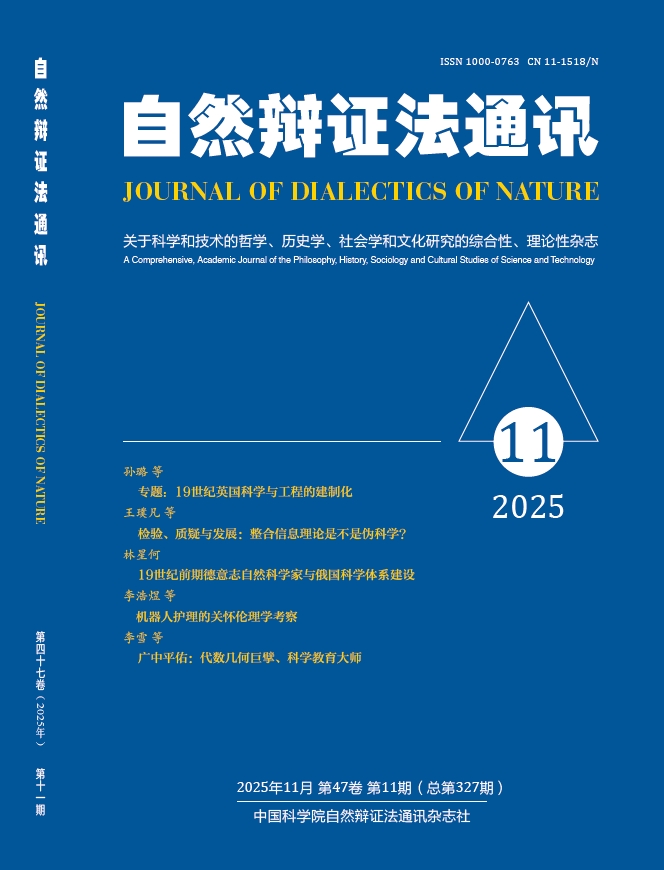
Hot Articles
View all
-
How Could AI Develop Its Self-consciousness? Abstract: The danger of AI will come from its self-consciousness rather than its capacity. AI would be a challenge to mankind if it develops a capacity for reflection on the system of its own, so that it would know how to remake its system with new rules, especially when it could invent its own language for all purposes, equal in capacity to human natural language, it could do anything it would. And AI would be most dangerous if it would be able to learn human desires, emotions and values, because all hostilities are based upon human desires and values.
-
From A Man-Machine Relationship to Inter Human Relations: Definition and Strategy of Artificial Intelligence Abstract: In order to distinguish the intelligent machine as a tool from the robot as a subject, the definition of human must change from essentialism to functionalism. So far, artificial intelligence has gone through three stages of development: formalization, empiricization and rationalization, but it is still not in the structure, but in the function of simulating human thinking. Only a functionalist definition of human beings can be compatible with the future of new species and new humans-"uncontrolled" robots. If "uncontrolled" robots emerge, the relationship between natural person and robot will develop from human-machine relationship to inter-human relationship. This relationship is neither the relationship between man and machine, nor the relationship between man and animal, nor the relationship between natural people. Natural people should not adopt the previous strategy to treat robots. Human supremacism is not self-evident. Natural man's self-re-evolution, man-machine parallel and man-machine fusion are feasible schemes for natural man to avoid being overtaken, replaced and eliminated by robots.
-
Non-Reductive Explanation in Biology: Context Arguments Abstract: Biological practice over the last several decades has shown that in many cases we cannot properly explain a higher-level phenomenon of interest only in terms of phenomena or mechanisms provided by lowerlevel explanations; to properly explain the higher-level phenomenon, information provided by the higher-level is also indispensable. One typical case is the context dependence of biological phenomena, namely, the occurrence of a higher-level phenomenon depends on its relevant environmental factors (e.g. cellular environments) which cannot simply be reduced to the lower-level (e.g. molecules) . On the other hand, the occurrence of the higher-level phenomenon can sometimes be independent of its lower-level underpinnings, since a change to the lower-level underpinnings does not necessarily result in corresponding changes in the higher-level. Facts based on these two sides constitute a ground for rejecting explanatory reductionism. This essay, by reference to examples drawn from biological practice, will discuss how contextual facts pose a challenge to explanatory reductionism.
-
Organismic Traits and the Explanatory Scope of Natural Selection Abstract: Could natural selection explain why an individual organism has the traits it does? Debates over this topic have lasted for decades in the philosophy of biology. Indeed, the negative view and the positive view have different interpretations of the very why-question. The two sides have posited different explananda: a whole explicit fact (for the positive view) vs. a particular contrastive focal aspect of the explicit fact (for the negative view). Both explananda are reasonable and acceptable. However, elimination of misinterpretation does not render the negative view true. Rather, I argue that the negative view as a universal proposition is indeed untenable, for there are counterexamples for it in cases of symbiosis, lateral gene transfer, and genic selection. Key Words: Organismic traits; Natural selection; Scientific explanation
-
Dr. Edward Hume: The Intermediary Who Promoted the Rockefeller Foundation’s Initial Public Health Practice in China Abstract: The Rockefeller Foundation intended to carry out hookworm disease treatment and prevention campaigns in many countries around the world at its initiation. Dr. Edward Hume, as the founder of the Yali Hospital and the Hsiang-ya Medical College in Hunan, tried to seek financial support from the Rockefeller Foundation in order to fulfill his plan in public health education in China. He used his connections and influence in Hunan to help the Rockefeller Foundation introduce the hookworm disease treatment and prevention project into China. In this transnational undertaking, Dr. Hume essentially played the role of an intermediary, who considerably promoted the Rockefeller Foundation’s earliest public health practice in China.
-
Kinnosuke Ogura: A Pioneer in The Study of Social History of Mathematics Abstract: Kinnosuke Ogura was a renowned mathematical historian and educator in modern Japan. He has made outstanding contribution to the study of mathematics education and the history of mathematics. In the filed of mathematical history, he began to study the social problems of mathematics in the late 1920s. He believed that the sociality of mathematics must be concretized in the study of mathematical history, and investigated the relationship between the ideology, the economic foundation and the development of mathematics. He was a pioneer in the social history of mathematics. Key Words: Kinnosuke Ogura; Mathematical history; Sociality
News & Events
Outside Links
JOURNAL OF DIALECTICS OF NATURE
- Contact Us
- Address: No.19A Yuquan Road, Beijing, 100049, China
- Phone: +86-10-88256007
- Email:jdn@ucas.ac.cn

Follow Us
© 2014 Copyright of the University of Chinese Academy of Sciences
© 2014 Copyright of the University of Chinese Academy of Sciences

